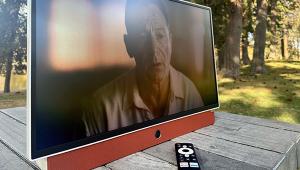Media Servers Page 4
| Media Managers |
| Another new server-like product category is the media manager. These have many of the home-networking and media-librarian features of audio and A/V servers, but instead of storing a music or movie collection on a built-in hard drive, they operate in tandem with one or more CD or DVD changers. You can also use them as media receivers (click to read) to communicate with and stream data from music servers. Examples of media managers designed to either work alone or complement a particular brand of media server include Escient's FireBall DVDM-100 (the April review is available on our Web site) and ReQuest's VideoRequest Digital Video Controller. A similar media manager with server-like functions is the Kenwood Entré, with a built-in 20-GB hard drive. - A.G. |
| Your Computer as Server |
| A computer can do everything a dedicated audio server can do and more. Since the 1990s, every new PC and Mac has had a CD-ROM drive that can rip music to an internal hard drive. The computer is the original digital jukebox. Most computers sold in the last few years have all the tools you'll need, including compression, database, and playback software. Pop in a CD, and it takes just seconds for the computer to go online and retrieve track lists and other information. But who needs CDs? The soaring popularity of copyright-respecting online vendors like Apple's iTunes Music Store puts good recordings within easy download of anyone with a credit card. Add subscription-based services like Radio@AOL, Rhapsody, Napster, and MusicMatch, each offering oceans of audio streams, and it's hard to imagine how music lovers get any work done. Purists complain that music files lack fidelity, but who says you have to compress to the max - or even compress at all? Computer hard drives today offer sumptuous capacity, and you can always add an external hard drive. If your computer is network-ready, you can multiply capacity by sharing. And networks make all your digital media easier to access. Being able to command a playlist from your Wi-Fi laptop means you can stay by the pool longer even though the music's stored on a desktop PC inside the house. If you have a dedicated audio server that recognizes a computer on your home network, you should be able to access and play music through it even when the files are stored on the computer. Alternatively, you can use a media receiver (see page 84) to send the computer files to rooms that don't have a computer. - Michael Antonoff |
- Log in or register to post comments

























































